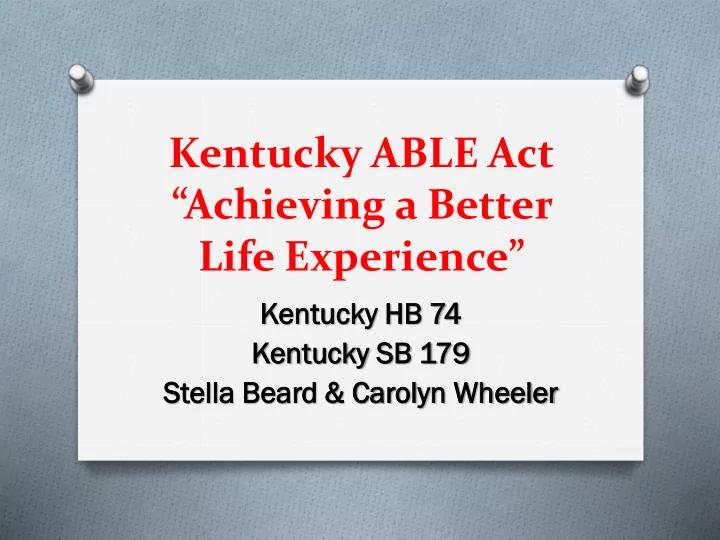

Kentucky ABLE Act “Achieving a Better Life Experience” Ken entucky ucky HB 74 Kent ntucky ucky SB 1 179 St Stel ella la Bea eard d & Car arolyn olyn Wh Whee eeler ler
What is The ABLE Act? The ABLE Act amends Section 529 of the Internal Revenue Service Code of 1986 to create tax-free savings accounts for individuals with disabilities. The bill aims to ease financial strains faced by individuals with disabilities by making tax- free savings accounts available to cover qualified expenses.
How did the ABLE Act start? Passed by the 113th Congress and signed into law on December 19, 2014 by President Obama, the Stephen hen Beck k Jr. Achieving a Better Life Experience Act of 2014 (ABLE Act) was started. Following the death of Stephen Beck Jr in December of 2014, the law was named to honor him, a parent from northern Virginia who helped conceive and develop The ABLE Act and who worked tirelessly for its passage. YOUR VOICE MATTERS!!! FIGHT FOR CHANGE!
What was in place before? Until the bill was signed in December of 2014, families with children with disabilities had little incentive to save for their future. If they saved more than $2,000 for college, an apartment or transportation to work, they risked losing critical benefits for their children, including medical and supplemental coverage. This piece of legislation is an important step toward empowering people with disabilities to achieve independence and affirms self-sufficiency.
The ABLE Act has 2 Purposes 1) To encourage and assist individuals and families in saving private funds for the purpose of supporting individuals with disabilities to maintain health, independence, and quality of life. 2) To provide secure funding for disability-related expenses on behalf of designated beneficiaries with disabilities that will supplement benefits provided through private insurance, the Medicaid program under title XIX of the Social Security Act, the Supplemental Security Income program under title XVI of such Act, the beneficiary’s employment, and other sources.
What is a 529 Account? Anyone – at any age – who plans to attend college can be the beneficiary of a 529 plan. The 529's earnings accumulate tax free, and withdrawals are federally tax-free and penalty-free as long as they are used at an eligible educational institution for: Tuition and fees Books Required school supplies Room and board Computers and related equipment (such as printers), Internet access, and educational computer software used primarily by the 529 plan beneficiary.
Regulations historically discouraged people with disabilities and their families from saving and working. Folks were afraid to save out of fear of losing their benefits if that had more than $2000 in savings. Change nge happened ened in 2014 Congr gress ess change nged d federal al laws s to elimin inat ate e these se restrict iction ions. s. Senator or Mitch ch McConn Connel ell and Senator or Rand Pa Paul and the entire ire US Ho House e delega egation tion all suppor orted ed this s change. nge. NOW W ea each state e must t make e thes ese e chan ange ges! s!
What is a 529(A) Account? The ABLE Act creates a new Section 529(A) establishing new tax-favored Qualified ABLE Programs in the Internal Revenue Code. Accounts are to be easy to open and available to folks and income and qualifying expenses will be disregarded or receive special treatment when determining the beneficiary’s eligibility for most federal means-tested benefits.
What Expenses? Education Housing Transportation Medical, Dental Care Financial Management Community Based Supports Employment Training and Support Assistive Technology Funeral/Burial Other expenses approved under regulation
Will I loose my benefits? The bill supplements, but does not replace benefits provided through private insurances, the Medicaid program, the supplemental security income (SSI) program, the beneficiary’s employment and other sources.
Who is Eligible? O Not everyone with a disability will be eligible for an ABLE account. To qualify, an individual must become disabled before age 26*. (Age of diagnosis is not a factor.) In addition, an individual either must be entitled to Supplemental Security Income (SSI) or Social Security Disability Income (SSDI) benefits or file a disability certification with the IRS. *Federal legislation introduced proposing increase to age 46
What does this mean for Kentucky? O SB 179 Amend KRS 205.200 to disregard any amount in an ABLE account, any contributions to an ABLE account, and any distribution from an ABLE account for qualified expenses for the purposes of determining an individual's eligibility for a means- tested public assistance program and the amount of assistance or benefits the individual is eligible to receive under the program; direct the State Treasurer, the Secretary of the Finance and Administration Cabinet, the Executive Director of the Commonwealth Council on Developmental Disabilities, and the Executive Director of the Kentucky Higher Education Assistance Authority to work cooperatively to seek all available sources of funding, determine the best plan of action related to ABLE accounts, and report to the Legislative Research Commission on or before December 31, 2016.
Who Supported the ABLE Act in Kentucky? O HB B 74 and d SB B 179 Sponsored by Representatives Denham, Wuchner, Combs, Glenn and Marzian and Senator Jones
Bill Passed O Signed into law by Governor Bevin on April 5, 2016
RESOURCES The ABLE National Resource Center http://www.ablenrc.org The Arc of the US http://www.thearc.org/ Ohio will be opening accounts nationally http://www.stableaccount.com/
Recommend
More recommend